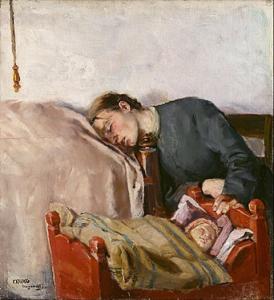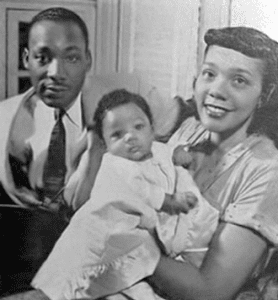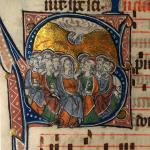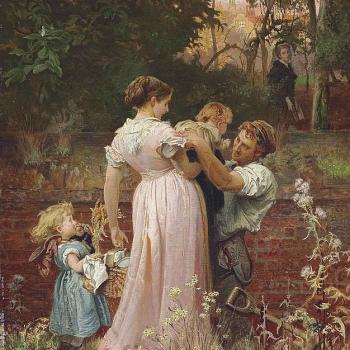
This post pays tribute to mothers on Mother’s Day and the importance of secure attachment for all of us in a secular age.
The Grinch and his Mother’s Deep Affection
I was watching Dr. Seuss’s 1982 classic, The Grinch Grinches the Cat in the Hat with my granddaughter Jaylah yesterday afternoon. Like a master psychologist, the Cat in the Hat discerns that the only thing that will change the Grinch’s nasty disposition is to reawaken the Grinch’s mother’s loving memory. The Cat in the Hat leads others in a song about his mother’s deep affection for the Grinch. It melts the Grinch’s cold heart and changes his course of action from bad to good.
The Importance of Secure Attachment for Human Flourishing

We all need secure attachment to go from bad to good and flourish as humans. Such secure attachment benefits them as they grow so that they, too, can foster positive, healthy relationships. One of the most important memories people recall in celebrating and honoring their mothers on Mother’s Day is the security they provided growing up.
Adults who experienced secure attachment involving responsiveness, sensitivity, and involvement as children often have both their mothers and fathers to thank for such dynamics. More recently, research focuses on attachment styles and attachment to unborn children during pregnancies and their long-term impact.
We should not give up if we did not experience secure attachment during our childhood and adolescence. According to one study, we can foster it in our relationships as adults when the following are in place: we are aware of our respective attachment styles and know when they are in play; are kind to ourselves rather than self-shame due to our shortcomings; seek help from a knowledgeable and discerning counselor; and are in healthy relationships where we can establish and cultivate secure attachment.
Charles Taylor on Growing Up in a Secular Age
It is not only Dr. Seuss and psychologists who weigh in on secure attachment. So, too, does philosopher Charles Taylor in his groundbreaking volume, A Secular Age. In his chapter titled, “The Immanent Frame,” he writes that for many moderns:
The real world is utterly indifferent to us, and even to a certain degree dangerous, threatening. As children, we have to see ourselves as surrounded by love and concern, or we shrivel up. But in growing up, we have to learn to face the fact that this environment of concern can’t extend beyond the human sphere, and mostly doesn’t extend very far within it.
But this transition is hard. So we project a world which is providential, created by a benign God. Or at least, we see the world as meaningful in terms of the ultimate human good. The providential world is not only soothing, but it also takes the burden of evaluating things off our shoulders. The meanings of things are already given…So religion emanates from a childish lack of courage. We need to stand up like men, and face reality. (Charles Taylor, A Secular Age {Cambridge, MA: The Belknap Press of Harvard University Press, 2007}, 561)
Taylor does not share this view of religion. Moreover, he believes this “immanent frame” outlook on life does not require us to reject belief in God or religion, which is the spin move in support of a closed universe of what he calls the mistaken “subtraction theory.” This “spin” involving secularization is open to serious questions and doubts (549-550). Later Taylor writes:
The logic of the subtraction story is something like this: once we slough off our concern with serving God, or attending to any other transcendent reality, what we’re left with is human good, and that is what modern societies are concern with. But this radically under-describes what I’m calling modern humanism. That I am left with only human concerns doesn’t tell me to take universal human welfare as my goal; nor does it tell me that freedom is important, or fulfillment, or equality. Just being confined to human goods could just as well find expression in my concerning myself exclusively with my own material welfare, or that of my family or immediate milieu. That in fact very exigent demands of universal justice and benevolence which characterize modern humanism can’t be explained just by the subtraction of early goals and allegiances (572).
The proponents of the subtraction theory of religion in our secular age must do the required heavy lifting and account for all values that undergird it. They must not presume and project that they operate in a natural way, that is, according to disengaged, neutral, scientific neutrality (560). The proponents of religious and non-religious outlooks alike must do the heavy lifting. Both orientations must account for how they socially construct life in our secular age. If we are completely honest and engaged dialogue partners, we will find ourselves “cross-pressured between the open and closed perspectives” in the immanent frame in this secular age (555).
Whether we felt secure in our mother’s arms growing up, we should not feel smug about our religious and secular, open and closed accounts of life in the universe. We should all seek to uncover the values and particular social constructions of life that undergird our efforts in making sense of our world. We must also seek to demonstrate that and how these values and constructions benefit human flourishing. The adherents of the great axial religious traditions, atheists, and others must not get so secure as to decry and dehumanize their ideological opponents.
Martin Luther King, Jr. and Secure Attachment
I close this blog post by accounting for the import Martin Luther King’ Jr.’s personalist faith and secure attachment to his parents growing up had on his public engagement in the Civil Rights movement. I wrote the following reflection in a recent volume titled More Than Things (page 68), closing with a quote from King:
King’s own nurturing, loving, and supportive home environment growing up led him to the conviction that there is a friendly, moral objective order to the universe. Only as we experience secure attachment with God and other people who serve as channels of God’s love, are we free to love our enemies as ourselves and fight for righteousness and the beloved community. As King writes, “I am convinced that the universe is under the control of a loving purpose, and that in the struggle for righteousness man has cosmic companionship. Behind the hard appearance of the world there is a benign power.” (Martin Luther King, Jr., “Pilgrimage to Nonviolence,” in Strength to Love {New York: Harper& Row, 1963}, 141.)

I pay tribute this day to all those mothers long past and alive now for providing secure attachment for their children. Where would we be without Dr. King’s mother, or his wife Coretta, and their influence on the great civil rights leader and his legacy of a just and unconditional love? And where would I be without my late mother’s undying care for me? Where would my traumatically brain injured son Christopher be without his mom’s sacrificial and tenacious care for him these past three years? Finally, from a biblical vantage point, where would we all be without the God who cares for us as a mother hen, longing to gather “her chicks under her wings”? (Matthew 23:37)
No matter where you and I place ourselves in the immanent frame in our secular age, closed or open, and “cross-pressured” though we may be, may we seek to foster secure attachment in our relationships with others for the common good. I wish all of you who are mothers a blessed Mother’s Day!














